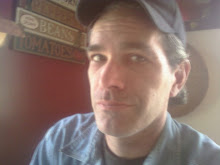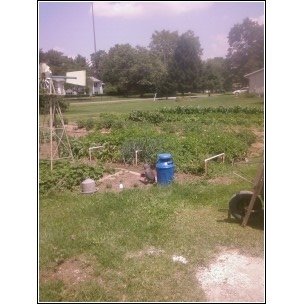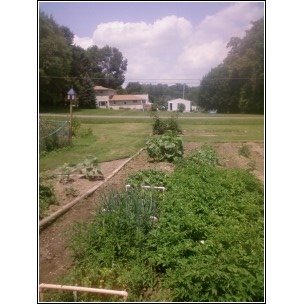In my ever increasing desire to know more about the things that interest me, I'm always reading. I read online forums, I read magazines, and I read books. Lots of books. My small library includes books on survivalism, preparedness, gardening, small scale livestock, herbal remedies, self suffiency, self reliance, and on our basic food supply in general. I'm not an educated man, but I have a strong desire to learn as much as I possibly can through reading and experience.
Every once in a while, I read that story or book that makes me say "wow". That story about some kind of real life hero, the article about the family growing a huge amount of food on a small suburban lot, or the tale of a persons fight with their town council to allow them to have a simple vegetable garden. All of these stories affect me in some form or another. Some perk my interest, some inspire me, and others make me push what I can possibly do here on one acre. My most recent read has done all of these and more. This one book has awakened me to the reality of the food we eat, and the real truths behind them.
I'm referring to "Everything I Want To Do Is Illegal", by Joel Salatin. Anyone who has watched Food Inc. or some of the other documentaries on the subject may recognise his name. He's making quite a stir in the food industry with his common sense approach, even though it angers and scares the officials and (so-called) inspectors. Joel is more than a simple farmer. He's a speaker, an educator, and a giant inspiration to many like myself. This book is merely a small list of stories from his own (mis?) adventures, run-in's, wins, and losses within the administrations, officials, inspectors, and law makers that every day involve our food systems.
Generally, when people think of farms, they think of happy cows, smiling farmers, sunshine, and a big red barn. In reality, most farms are virtually devoid of people. Animals are kept indoors in big confinement cages or feedlots. Most never see the light of day until they are on their way to slaughter. Joel prefers a simple, humane, and much more common sense approach. Let pigs be pigs, cows be cows, and manure and compost are king. Unfortunately, what he wants to do gives him the perfect title for this book. Everything I want to do is illegal.
I won't go into details, or give away a lot of the book, but imagine wanting to do some things on a 600+ acre farm, and find out you aren't allowed. I'll list a few examples:
Imagine that you want to raise cattle to sell the meat. You can raise your own, but you cannot butcher them on your own property. OK, so you take them to a commercial butcher and have them processed. You bring them home in nice little packages to sell, but wait; you still can't sell them. Now because they're in packages, they are considered a processed product and you don't have the proper licenses to sell them.
How about if you are OK to butcher and sell your own chickens, but only in your home state. A friend wants to sell them at a farmers market in the adjoining state, but you aren't certified there. Your chickens have to travel 200 miles to be killed in a place with that states license, then travel another 400 miles to be packaged, then another 300 miles to the farmers market that is 150 miles from your farm.
Bacon is the most evil of all possible farm products. Even if you raise the pork, buy the ingredients yourself, and take all responsibility for it; you cannot sell it. Nobody gets in to buy the bacon, not no body, not no how. It's again a "processed" product.
Here's one that I didn't intend to share, but decided to anyway. On his search for the selling of chicken outside his state, he took some to a commercial butcher, visited, and talked with the inspector. Now, when you clean a chicken, the gall bladder is right behind the liver. There is a market for chicken livers, so they are saved. If you happen to break the gall bladder, you get this disgusting, foul smelling green bile. There's no mistaking it. When he processes his own, like many others, he's careful to not break the gall bladder for this reason. He was talking to the state inspector, when along the conveyor belt came an iced tub of chicken livers, literally floating in the green bile. The inspector said NOTHING about the bile. He just dipped a thermometer in the tub and said "more ice". So having this disgusting bile in the tub was ok, but it could not get below temperature X. Even though I don't eat chicken livers, I nearly gagged at the thought of eating one from the store.
These are just examples of many that Joel covers in this book. He goes from animal welfare to zoning, and everywhere in between. I'm aghast, disgusted, and angry at the things people must do to comply with the ridiculous regulations governing our food systems. Some may seem necessary to the average consumer, but when you see how they really operate behind the scenes, you realize how ridiculous they really are. In fact, his writing of this very book on his own property is in fact illegal by the terms of an "agricultural zone". How’s that for a big steaming pile of future compost?
This book is more than just an idea book for the farmer or urban (holy crap he's gonna say it) homesteader. It's more than just a list of things to make you think about what you are buying at the store or the butcher. It's an eye opener to the scandals behind the food industry, and how big corporate dollars make every decision. If that wasn't true, why would a 1000 chicken operation have the same exact guidelines as a 1,000,000 chicken operation? Why would inspectors care about a guy with 300 cattle more than the feedlot containing 300,000?
I'll recommend this book to everyone I know. Anyone that cares the slightest bit about what they buy or what they eat should have this on their shelf. Maybe a few that don't seem to care would have their eyes opened just a little on the reality of where there food comes from. Just maybe.
After reading this book, I'm more inspired than ever to grow in our own operations here at home. I'm researching cattle and pig raising, and plan on talking to my uncle about putting one of each at his place. I want to raise more. I want to grow more. I want to get even further away from the grocery store and the clutches of the people behind the food on the shelves and in the coolers. I want the freedom to eat what I want, that "they" want so desperately to take away from us even more than they have. Honestly, how can it be perfectly OK for me to buy a pack of cigarettes, a bottle of whiskey, and a bag of fast food, but not a gallon of raw milk? How is it possible that I can buy a giant block of “processed cheese product”, but not some delicious colby made with fresh milk? How and why is it their choice what I put into my own body?
I'll leave you with a quote from the book that may make you consider getting your own copy- " The political rationale for food safety ultimately rests in the notion that we are wards of the state. Not a free people." Really think about that statement. Are we truly free when we cannot eat what we choose?









